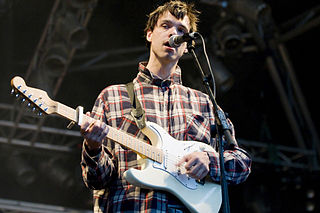Top 80 Quotes & Sayings by David Longstreth
Explore popular quotes and sayings by an American musician David Longstreth.
Last updated on April 15, 2025.
When I first heard Bjork's music, I felt like I was a similar-minded thinker, both harmonically and melodically. She takes those things that you naturally assume to be opposite because they're presented that way most of the time, and the way she twines them together is so beautiful. To be able to do that is so powerful.
I've always loved cuneiform; I've always loved the way it looks. I love that it's the world's oldest script. And the creative potential of bad translation or misunderstanding or something has always been at the core of the idea of 'Dirty Projectors.' So the cuneiform is pretty playful - basically, just a joke.
Songs, a while ago, became the medium through which I process most of the information that I receive and feel. But I go back and forth about whether this is all of life or whether you're missing something important in living and whether or not, as a humanist, you're abnegating a certain responsibility if this - this art - is just where you are.
It's helpful to just hear things through friends' ears, people who know you well. I guess when I started Dirty Projectors, when I was, like, 20, I always imagined it would be kind of like an amphibious vehicle: something that could go with me wherever I need to go. That kind of constant change has been in the DNA from the beginning.
I'm from the East Coast; I think about things dialectically sometimes - in other words, antagonistically. The rhythms that I think of are polyrhythmic, bouncy, loping. The way that I want to approach that is to get, like, a flat-footed Connecticut hard-core drummer to play these bouncy, loping polyrhythms.
As far as working with Kanye and Solange, that was amazing. After 'Swing Lo Magellan', I needed a change. Getting to work in that capacity, writing for other people and working for other people as a writer and as a person who's not representing it as the front person or whatever - it's such a different perspective you can get.




















